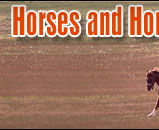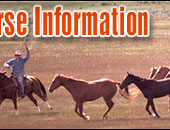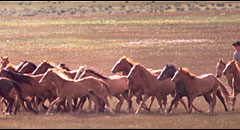 |
   |
|
|
|
You are here: Horses > Horse trainers > Horse Trainers And Problematic Behavior |
Problematic Equine Behavior - How a Horse Trainer Can Help – Part II
By Jeffrey Rolo - Experienced horse owner, trainer and breeder
In the first part of this article we determined that while it's ideal for a horse owner to address his own horse's behavioral problems, there are times when an outside horse trainer will be necessary. We have discussed the need to determine both the severity of the behavioral problem as well as your emotional mindset, so let's continue on from there. |
|
|
Determine the Cause
This is an absolutely critical step that many horse owners, and even some horse trainers, gloss over. They see a negative behavior and instantly focus on a boilerplate corrective action without ever paying any mind to what may be causing the poor behavior in the first place. That's as irresponsible as a physician handing you a bottle of prescription pills without actually taking the time to determine your ailment! |
Not all behavioral problems are direct challenges to your authority. Problems could be caused by perceived threats around their surroundings. They could be caused by health problems, such as a developing hoof abscess. They could be caused by poorly-fitting tack that pinches them, or a riding bit that aggravates a horse's wolf tooth. They could be defensive mechanisms the horse developed from a prior abusive owner. Or they could simply be bad habits they picked up from another horse.
As a horse's caretaker, it's your responsibility to understand why the horse is acting out, because the corrective actions may differ based on your findings. For example, a mother wouldn't always handle a crying toddler the same way. If the toddler was throwing a temper tantrum, she might chastise or ignore the bratty toddler so as not to encourage such behavior in the future. On the other hand, if the toddler was crying because it was frightened or in pain, she would (hopefully!) immediately step in and console him.
Help! I Need a Horse Trainer!
Let's say that you have taken everything into account and determined that the behavioral problem is beyond your ability to address on your own. You're given it the old college try and found that expert assistance is critical. What now?
First, understand that not all horse trainers are created equal. I urge you to seek the aid of a trainer that practices natural horsemanship rather than domination. Horses shouldn't yield to his wishes because of his force of will… they should do so because of his ability to communicate with them.
Most horse trainers will quickly proclaim they practice natural horsemanship, but don't take their word for it. Many can talk a good game, but if you're going to place your horse's comfort and welfare into the hands of a stranger, you should be darn sure he's actually qualified.
The best way to do this is to watch a trainer interact with horses, both his own and ideally yours too. Prior to observing the trainer, you should become well versed with natural horsemanship yourself so that you know what to look for. Rent or purchase a video from John Lyons or another natural horseman, or study websites such as AlphaHorse where the art of natural horsemanship is discussed in detail. You don't need to master natural horsemanship, but you should have a basic understanding of it so that you can identify it when you see it in action.
I would strongly recommend that you observe the first couple of training sessions to make sure the trainer is competent and your horse is being treated properly. For this reason I encourage you to solicit the aid of a local trainer rather than ship your horse away to a distant training facility. If the trainer can come to your facility to perform the training, all the better, but it's not essential that your horse remain on your premises. What's important is that you are close enough to observe some of the training sessions and check up on your horse's wellbeing from time to time.
Finally, I always encourage horse owners to seek out a trainer that will allow them to partake in some training sessions. This serves two purposes: first, it expands your education and teaches you how to confront similar problems in the future, and secondly, by playing an active role in the corrective actions, you'll cede less of your authority to the outside horse trainer.
During the initial sessions some trainers will understandably want to work with a horse one-on-one since that single-minded focus between horse and handler is a critical element of natural horsemanship, but they shouldn't object to allowing you to observe, nor should they object to allowing you to participate from time to time once the training is well underway.

|
Read the next horse trainers article on trainer for gaited horses. |
|
|
|
|
 |
|
|
|
|
|
Horse Education
|
|
|
|
|
Horse Information Topics
|
|
|
|
|
|
|
|
Horse Business Owners
|
| |
Advertise with Us
Have your horse products or services exposed to over 27,000 of our monthly visitors.
|
|
|
|
|
|